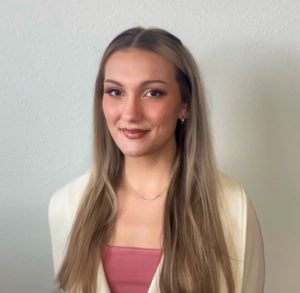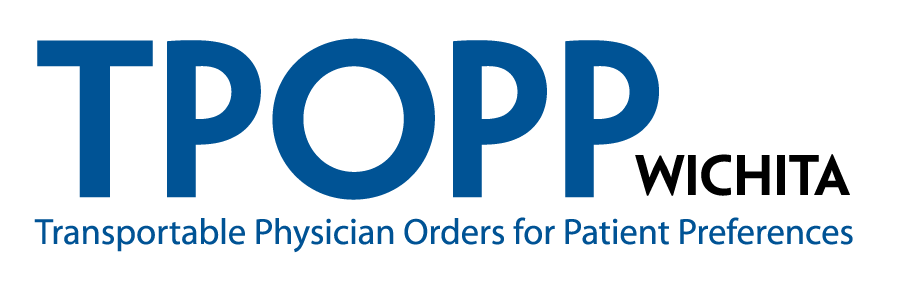Internships at the Center for Practical Bioethics are, well, practical.
Practical for the Center and practical for the students who spend anywhere from a couple of weeks to several months working with us.
Right now, we have two interns working at the Center. Both are students, and both are involved with Advance Care Planning programs that target populations whose healthcare needs, for entirely different reasons, are not being met.
Advance Care Planning in Latino Communities

Marissa Hernandez, a graduating Health Science major at Rockhurst University, is working at the Center with Polo Camacho, PhD, Health Ethics and Community Engagement Program Manager, to present bilingual, culturally sensitive Advance Care Planning workshops for adult Latinos in collaboration with El Centro, Inc. of Kansas City, KS.
Numerous studies suggest a need for culturally sensitive approaches to Advance Care Planning, especially in the Latino community. The Center was recently awarded a Health Forward Foundation grant to host ten Advance Care Planning workshops in Spanish with program materials from the Center’s Caring Conversations workbook, PROJECT TALK, and the Prepare Your Care program. The long-term goal of the project is to improve interactions between Latino families and care providers and to increase use of Advance Care Planning resources by the Latino community.
Marissa is researching the literature on Advance Care Planning in Latino communities and will help facilitate the first workshops this fall.
Advance Care Planning for the Seriously Ill

Transportable Physician Orders for Patient Preferences (TPOPP) is a voluntary program that helps patients and their physicians align treatment plans with the patient’s goals and values. The TPOPP form, signed by the patient’s physician, tells healthcare providers the patient’s goals of care, including what treatments they want, even if the patient transfers from hospital to nursing home, back to home, to hospice or another setting.
Like Marissa, Ashley Glass, a second year medical student at Kansas City University, is focused on Advance Care Planning, but in her case it’s a program for people living with serious or life-threatening illness.
The Center provides training and resources for clinicians and providers at various stages of developing TPOPP programs across Kansas and Missouri. Ashley is helping to edit the Center’s new TPOPP Clinical Guide to be published in coming weeks. She is also contributing to writing the Ethics Dispatch, a monthly newsletter for Ethics Committee Consortium members that contains discussion of bioethics issues, related news, case studies and philosophical musings.
Bioethics and the Next Generation
Both Marissa and Ashley envision a future in which bioethics plays an important role.
Marissa, who grew up in Lee’s Summit, MO, found her way to the Center from her Theology, Morality and Healthcare Class at Rockhurst where her professor uses the Center’s bioethics case studies and resources with his students. Upon graduation, she’s considering pursuing a Master of Bioethics degree at Kansas City University.
Ashley, who grew up in Akron, OH, and earned a Master of Arts in Bioethics from The Ohio State University, hopes that her work at the Center will strengthen her skills as a clinical ethicist and her ability to develop ethics programs wherever her medical career leads her. For now, she’s particularly interested in psychiatry and neurology, which she attributes to hardships she and her family experienced growing up.
“Working at the Center offers interns a unique opportunity to apply bioethics to the real world,” said Dr. Camacho. “Whether it’s historically undeserved communities or those dealing with serious illness, Ashley and Marissa’s work will actively contribute to helping people achieve goal-concordant care. We are lucky to have them.”
Interns Give and Gain Practical Experience
Internships at the Center for Practical Bioethics are, well, practical.
Practical for the Center and practical for the students who spend anywhere from a couple of weeks to several months working with us.
Right now, we have two interns working at the Center. Both are students, and both are involved with Advance Care Planning programs that target populations whose healthcare needs, for entirely different reasons, are not being met.
Advance Care Planning in Latino Communities

Marissa Hernandez, a graduating Health Science major at Rockhurst University, is working at the Center with Polo Camacho, PhD, Health Ethics and Community Engagement Program Manager, to present bilingual, culturally sensitive Advance Care Planning workshops for adult Latinos in collaboration with El Centro, Inc. of Kansas City, KS.
Numerous studies suggest a need for culturally sensitive approaches to Advance Care Planning, especially in the Latino community. The Center was recently awarded a Health Forward Foundation grant to host ten Advance Care Planning workshops in Spanish with program materials from the Center’s Caring Conversations workbook, PROJECT TALK, and the Prepare Your Care program. The long-term goal of the project is to improve interactions between Latino families and care providers and to increase use of Advance Care Planning resources by the Latino community.
Marissa is researching the literature on Advance Care Planning in Latino communities and will help facilitate the first workshops this fall.
Advance Care Planning for the Seriously Ill

Transportable Physician Orders for Patient Preferences (TPOPP) is a voluntary program that helps patients and their physicians align treatment plans with the patient’s goals and values. The TPOPP form, signed by the patient’s physician, tells healthcare providers the patient’s goals of care, including what treatments they want, even if the patient transfers from hospital to nursing home, back to home, to hospice or another setting.
Like Marissa, Ashley Glass, a second year medical student at Kansas City University, is focused on Advance Care Planning, but in her case it’s a program for people living with serious or life-threatening illness.
The Center provides training and resources for clinicians and providers at various stages of developing TPOPP programs across Kansas and Missouri. Ashley is helping to edit the Center’s new TPOPP Clinical Guide to be published in coming weeks. She is also contributing to writing the Ethics Dispatch, a monthly newsletter for Ethics Committee Consortium members that contains discussion of bioethics issues, related news, case studies and philosophical musings.
Bioethics and the Next Generation
Both Marissa and Ashley envision a future in which bioethics plays an important role.
Marissa, who grew up in Lee’s Summit, MO, found her way to the Center from her Theology, Morality and Healthcare Class at Rockhurst where her professor uses the Center’s bioethics case studies and resources with his students. Upon graduation, she’s considering pursuing a Master of Bioethics degree at Kansas City University.
Ashley, who grew up in Akron, OH, and earned a Master of Arts in Bioethics from The Ohio State University, hopes that her work at the Center will strengthen her skills as a clinical ethicist and her ability to develop ethics programs wherever her medical career leads her. For now, she’s particularly interested in psychiatry and neurology, which she attributes to hardships she and her family experienced growing up.
“Working at the Center offers interns a unique opportunity to apply bioethics to the real world,” said Dr. Camacho. “Whether it’s historically undeserved communities or those dealing with serious illness, Ashley and Marissa’s work will actively contribute to helping people achieve goal-concordant care. We are lucky to have them.”



